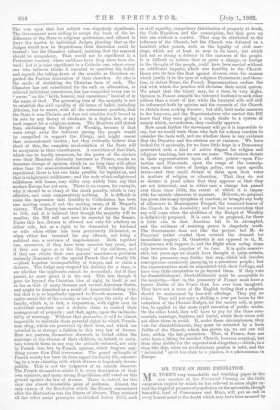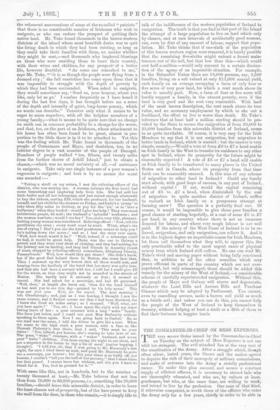MR. TUKE ON IRISH EMIGRATION.
MR. TUKE'S very remarkable and touching paper in the new number of the Nineteenth Century, on the little emigration exploit by which he has relieved to some slight ex- tent the frightful pressure of population on the miserable, though beautiful, land of Connemara and Mayo, will put an end in every honest mind to the doubt which may have been aroused by the vehement asseverations of some of the so-called " patriots " that there is no considerable number of Irishmen who wish to emigrate, or who can endure the prospect of quitting their native land. Mr. Take found thousands in the barren western districts of the island whose most heartfelt desire was to quit the living death in which they had been existing, so long as they could take their families with them, no matter whither they might be sent,—and thousands who implored blessings on those who were enabling them to leave their country, with their wives and children, for any prospect- of a better life, however doubtful. "As some one remarked to me," says Mr. Take, "'it is as though the people were flying from a doomed city ; ' the full conviction has come upon them that it was impossible to struggle with the depth of poverty by which they had been surrounded. When asked to emigrate, they would sometimes say, 'Send us, your honour, where you like, only let us go.' I confess frequently as I have heard it during the last few days, it has brought before me a sense of the depth and intensity of quiet, long-borne penury, which no words can describe." Conceive only what it means to be eager to move anywhere, with all the helpless members of a young family,—what it means to be quite sure that no change on earth can in common probability be a change for the worse, and that, too, on the part of an .Irishman, whose attachment to his home has often been found to be great, almost in pro- portion to the little there is in it to be attached to. Yet this was the feeling which Mr. Tuke found in thousands of the people of Connemara and Mayo, and doubtless, too, in no inferior degree in a vast number of the people of Donegal. Numbers of people walked "ten, fifteen, and twenty miles from the further shores of Achill Island," just to obtain a chance,—which was no moral certainty at all,—of assistance to emigrate. Take only one single instance of a poor woman's eagerness to emigrate ; and hers is by no means the worst one recorded :— " Taking a stroll on my return, I met the relieving-officer of the district, who was seeking me. A woman (always the first here) had come beseeohing and imploring help from him. She had sold her little heifer and all her belongings, and just raised enough wherewith to buy the tickets, costing 216, which she produced, for her husband, herself, and her child for the steamer on Friday, and hadn't a penny to take them fifty miles to Galway, or pay for the kit,' or to lave a halfpenny' when they landed—would 1 give her help ? They were most industrious people, he said ; the husband a 'splendid' workman ; and the woman was hero ; would I see her P Yes ; and a very tidy, pleasant. looking young woman was introduced. Relieving-officer: Now, tell the gentleman the story ; every word must be truth. Whist, what's the nee of crying ? Don't you see the kind gentleman means to help you ? be's taking down the notes ;' and so I had the story over again. Well, how much would it be ?" Well, indeed, if a sovereign could be had, it would be great help. Theta was the oar to Galway a pound, and they were very short of clothing, and they had nothing for the journey nor on landing, and they had friends in Ameriky (burst of tears, stopped by relieving-officer) somewhere, Alleghany County, Pennsylvania.' Well, how would they get there P She didn't know, but if the good God helped them to Boston, she must lave that. Then I summed up the very lowest that all these would cost, and hearing from the landlady of the hotel that her story was quite true, and that she had been a servant with her, I told her I could give Ed for the whole, so that they might not be stranded in the streets of
Boston. She hardly took it seriously at first ; it seemed so unreal. She had asked for a sovereign, and had EU promised. 'Well, then,' at length she burst out, then it's the Lord himself as has sent you to me this day—praised be his holy name.' This was our first case. Well, for the sequel. The next morning I left Glendalough ; and, just as I was leaving, I thought I saw the same woman, and it flashed across me that I had been deceived, for I knew she lived six miles away ; so I stopped. 'Well, what, are you here again F' Yes, sir ; I have spent the night with my sister taking leave of her ; a poor creature with a long " wake " family. She lives just below, and I could not pass Miss Mullarehy without speaking to them again. Now I am going back 0 Cashel,' So, as our road was the same, I told the driver to give her a seat. When we came to the high road, a poor woman, with a face so like Hannah Flaherty's, was there, that I said, This must be your sister." Yes, indeed, yer honour, she's coming to take lave of me. The poor, " wake " creature, with a " wa.ker " husband, and seven poor " wake " children. I've been crying the night to see them and not a sixpence in the house to buy a bit of meal' (rather begging, I thought). I told you, sir, that I was going to Mr. Maeready's last night, for sure I lived there as cook, and good Mr. Macready he gave me a sovereign, yer honour ; but this poor sister is so badly off yer honour, I couldn't "tell you the half of her poverty," that I must leave her that pound. I cannot leave her without, and it's you I have to thank for it. Yes, God be praised for it.' "
With cases like. this, not in hundreds, but to the number of twenty thousand at least,—Mr. Take believes that not less than from 70,000 to 80,000 persons, i.e., something like 20,000 families,—should leave this miserable district, in order to leave the least chance not of prosperity, but of the bare power to keep the wolf from the door, to those who remain,—it is simply idle to talk of the indifference of the western population of Ireland to emigration. The truth is that you find in this part of the Island the attempt of a large population to live on land which only by chance, and at rare intervals of accidentally good seasons, can, even by dint of any amount of labour, support that popu- lation. Mr. Take thinks that if one-sixth of the population of this barren western region were removed, it is barely possible that the remaining five-sixths might extract a decent main- tenance out of the soil, but that less than this—which would cost half-a-million—would only amount to a certain diminu- tion of the agony of an impossible situation. For example, in the Belmullet Union there are 16,000 persons, .say, 3,500 families, living on a soil valued at only £11,000 annual yield, each family on an average occupying a farm of only four or five acres of very poor land, for which a rent much above its value is usually paid. Now, a farm of four or five acres will hardly support a family, in the utmost poverty, even if the land is very good and the rent very reasonable. With land of the most barren description, the rent much above its true value, and no accessory employment by which to eke out a livelihood, the effort to live is worse than death. Mr. Tuke's inference that at least half a million sterling should be pro- vided by the State to secure the emigration of from 20,000 to 25,000 families from this miserable district of Ireland, seems to us quite inevitable. Of course, it is very easy for the Irish Members to say that it is not emigration, but migration to better lands in Ireland, which is wanted ; but the answer is very simple, namely,—Would a vote of from £6 to £7 a head enable an Irish family in the West to transfer its residence to any other• spot in Ireland, where its prosperity for the future might be reasonably expected ? A vote of £6 or £7 a head will enable an Irish family to be transferred to many places in the United States and in Canada, where its prosperity from that time forth can be reasonably ensured. Is this true of any scheme of migration to other land in Ireland ? Could any family start afresh, with good hope of success, in any part of Ireland,, without capital ? If not, would the capital remaining out of £6 to £7 a head, when diminished by the cost of migration to quite another district of Ireland, suffice to embark an Irish family on a prosperous attempt at farming anew ? The question is a perfectly final one. Of course, it would be impossible to give these poor families a good chance of starting hopefully, at a cost of some £6 to £7 per head, in any country where there is not an immense demand for labour, and where very rough labour is not well paid. If the misery of the West Coast of Ireland is to be re- lieved, emigration, and only emigration, can relieve it. And it is in the highest degree an unpatriotic course for Irish Members, let them call themselves what they will, to oppose this, the only practicable relief to the most urgent cause of physical misery from which Ireland still suffers. No one can read Mr. Take's vivid and moving paper without being fully convinced that, in addition to all the other remedies which may prove efficient in parts of the country which are not over- populated, but only mismanaged, there should be added this remedy for the misery of the West of Ireland,—a considerable scheme of carefully superintended emigration. Without this, the people of Mayo and Galway will starve and degenerate, whatever the Land Bills and Arrears Bills and Purchase Clauses which may be adopted by Parliament. You cannot, even by cancelling arrears, make a barren soil yield as much as a fertile soil ; and unless you can do this, you cannot help the people of the West of Ireland to keep themselves in decency, without helping at least a sixth or a fifth of them to find theirlortunes in happier lands.



































 Previous page
Previous page